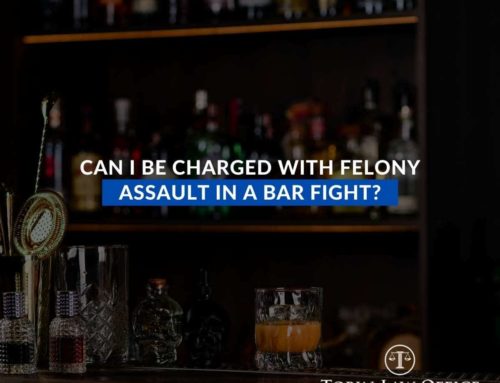Self Defense Laws in the State of Arizona: When is assault or physical force justified?
In Arizona, people are sometimes allowed to use or threaten physical force when confronted with unlawful physical force, or when preventing certain serious crimes specified by Arizona law. Under ARS 13-404, people are justified in using physical force when a reasonable person, in their shoes, would believe it’s necessary to protect against an immediate threat.
Self Defense Laws in the State of Arizona: When is assault or physical force justified?.
Self Defense Only Applies When it’s Reasonable, Proportional, and Immediately Necessary.
The Arizona Courts have explained that Arizona’s justification statute, A.R.S. § 13-404, which permits a person to act in self-defense in certain circumstances, doesn’t allow unlimited use of physical force. The statute only authorizes force to the extent that a reasonable person would believe is immediately necessary to protect against another’s unlawful force. State v. King (2010) 225 Ariz. 87, 235 P.3d 240. Arizona uses the objective reasonable man test: the jury must determine what the reactions of a reasonable person would have been in the defendant’s position and whether the defendant reasonably believed that he was in danger. State v. Eddington (1963) 95 Ariz. 10, 386 P.2d 20. Thus, any unreasonable or disproportionate use of force in self-defense is not allowed. State v. Tuzon (1978) 118 Ariz. 205, 575 P.2d 1231.
Defense of Others in Arizona under ARS 13-406.
Under ARS 13-406, a person is justified in threatening or using physical force to protect others to the extent that that the other person would be allowed to defend himself. Thus, the person you’re defending must have been justified in using self-defense. And as always, the force or threat used must be reasonable, proportional, and immediately necessary.
When is Deadly Force Permitted in Arizona?
Under ARS 13-405, the use of deadly force is sometimes permitted in Arizona. However, it’s limited to narrow circumstances. You can only use deadly force if you’re in reasonable fear of immediate serious physical injury or death. In order to lawfully use deadly force against someone, a reasonable person, in the defendant’s position, would need to believe that deadly force was immediately necessary to protect against potentially deadly force. That’s because self-defense must always be reasonable, proportional, and immediately necessary. Unless you’re faced with the immediate threat of serious physical injury or death, you cannot use deadly force.
By way of example, if someone were to threaten you with a gun, it would likely be reasonable to kill or seriously injure the other person in an effort to save your own life. Conversely, if someone slapped or punched you, it would be highly unreasonable to kill or cause serious injury to that person. Just because you’re threated or confronted with physical force, doesn’t mean you can retaliate or seek vengeance. You’re only justified in using deadly physical force when a reasonable person would believe that it’s immediately necessary to protect against deadly force. State v. Andersen (App. Div.1 1993) 177 Ariz. 381, 868 P.2d 964.
Arizona “Stand Your Ground” Laws
While Arizona doesn’t have an explicitly titled “stand your ground” law, Arizona laws effectively allow people to stand their ground—there’s no duty to retreat before defending oneself. Thus, if you’re not engaged in an unlawful act, and you’re in a place you have a right to be, you don’t have retreat when someone threatens or assaults you. Nevertheless, you can only use proportional and reasonable force when immediately necessary.
By way of example, if someone were to push you in a parking lot, you couldn’t retrieve a baseball bat from your car and swing at the aggressor. A baseball bat, in that scenario, is a dangerous instrument that can cause serious injury or death. That’s not a proportional or reasonable use of force when standing your ground against a push; however, you could certainly push back since there’s no duty to retreat. In another example, if someone pointed a gun at you, and you reasonably feared for your life, you would be justified in threatening or using deadly force against that aggressor.
When Self-Defense Doesn’t Apply in Arizona: Limitation on the Self Defense Claim.
While Arizona allows for reasonable and proportional self-defense, as well as the right to stand your ground, it’s extremely important to realize that there are several limitations to self-defense in Arizona.
- Self-defense doesn’t apply when you’re only confronted with verbal provocation. For instance, if someone swears at you, or calls you an insulting name, you cannot respond with physical force, nor would you be permitted to threaten violence.
- Self-defense doesn’t apply when resisting an arrest made by law enforcement. Thus, practically speaking, even if you’re not guilty of an offense for which you’re being arrested, you cannot resist arrest or defend yourself. The only exception would be if the officer was using unreasonable, excessive, and unlawful force. Most defense attorneys would agree that it’s extremely rare to successfully argue that someone was justified in resisting an arrest by law enforcement.
- Self-defense doesn’t apply if you provoked the initial encounter. Under Arizona’s A.R.S. § 13-404, an essential element of self-defense is the defendant’s freedom from fault in provoking the situation that gave rise to use of force. State v. Zamora (App. Div.1 1984) 140 Ariz. 338, 681 P.2d 921. Carter v. State (1916) 18 Ariz. 369, 161 P. 878. The only exception would be if you withdrew from the encounter, clearly communicated withdrawal to the other person, and despite the clear communication of withdrawal, the other person continued to use physical force against you. One who is the aggressor or provokes difficulty cannot invoke right of self-defense to justify or excuse the conduct unless he in good faith withdraws from the combat in such a manner as to show his adversary the intention in good faith to stop the encounter. State v. Myers (1942) 59 Ariz. 200, 125 P.2d 441; State v. Lujan (1983) 136 Ariz. 102, 664 P.2d 646.
- Self-defense doesn’t apply unless you immediately need to use it. The threat against you must be in the present moment—not minutes, hours, or days ago. The operative language is immediate. For example, let’s say John punched Mike in the grocery store, Mike couldn’t go outside, wait for John in the parking lot, and then punch him back. The immediate need for self-defense in such a scenario would have clearly subsided. Mike would only be justified in punching John when he was initially assaulted by John inside the grocery store. Self-defense no longer applies when the threat has passed. Once the threat of unlawful force or conduct has passed, the only recourse is to report the criminal act to police or file a civil lawsuit.
Under ARS 13-411, Arizona Permits The Use of Force When Preventing the Commission of Certain Serious Crimes.
Arizona has specific self-defense laws that apply to preventing the commission of some serious crimes. In these limited scenarios, you can use a reasonable degree of physical force—even deadly force when it’s reasonably and immediately necessary. To apply, you must be in a place you are lawfully allowed to be. Also, you must reasonably believe that the level of force used is necessary to prevent the following specific crimes: armed robbery, aggravated assault, sex crimes, burglary, arson, kidnapping, manslaughter, murder, sexual conduct with a minor, and child molestation. As always, the degree of force must be reasonable and the need to use force must be immediate. It is always a good idea to consult your San Tan Valley criminal defense attorney as soon as possible to ensure that your rights are protected.
Arizona “Stand Your Ground” Law
Arizona’s self-defense and defense of others are listed as justification defenses under Arizona’s criminal code. These justification defenses are often referred to as stand your ground laws by the general public. Such a reference comes from the implication that when you’re at a location where you’re lawfully permitted to be, you don’t have to retreat when someone confronts you with assaultive behavior. Nevertheless, all of the limitations on self-defense still apply. Any self-defense used must be reasonable, proportional, and immediately necessary to prevent the unlawful conduct of another. Working with a criminal defense lawyer ensures that your interests are represented and protected.
Arizona Castle Laws and Defense against Home Intruders.
Arizona doesn’t have specific castle laws; however, Arizona does permit physical force, and deadly force when reasonable and immediately necessary to prevent several serious crimes, including Burglary in the first and second degree. Practically speaking, intruders inside the home can usually be reasonably perceived to be committing theft or another felony in one’s home, which is the definition of burglary. Thus, the use of physical force against home intruders is almost always permissible. Deadly force is also allowed, but it must be reasonable and immediately necessary under the circumstances.
Self Defense, Once Raised by a Defendant, Must be disproved by the Prosecutor.

When Raising Self-Defense, a Defendant can Sometimes Point Out the Violent History or Character of the Alleged Victim.
The alleged victim’s history or propensity for violence is relevant to the self-defense claim, but only if the Defendant had actual knowledge of the victim’s violent character or history. Unless a defendant can show that he observed or knew about victim’s prior acts before the incident in question, he cannot use that history to bolster the reasonableness of his self-defense. State v. Roscoe (App. Div.2 1994) 182 Ariz. 332, 897 P.2d 634.
Using Physical Force to Defend Against Theft.
In Arizona, under ARS 13-408, a person can use reasonable physical force to prevent theft or criminal damage of property that’s currently under their control and possession. However, if only the loss of personal property is threatened, one cannot use deadly force. For example, if a thief were to try to take your cell phone, you would likely be justified in kicking, punching, and slapping in an effort to stop the thief. Conversely, it would be unreasonable to shoot or stab that person, unless of course, the thief was simultaneously threatening deadly force.
Tim Tobin has years of experience as a criminal defense attorney. We can help you, when you need competent, legal representation.
When Charged with Assault, Disorderly Conduct, or any other Violent Offense, call Tobin Law Office for a Free Consultation.

Tobin Law Office
Mesa Office
1910 S Stapley Dr #221
Mesa, AZ 85204
Phone: 480-447-4837
Email: tim@tobinlawoffice.com
Website: https://tobinlawoffice.com/
Chandler Office
3100 W Ray Rd #201
Chandler, AZ 85226
Phone: 480-447-9877
Email: tim@tobinlawoffice.com
Website: https://tobinlawoffice.com/






